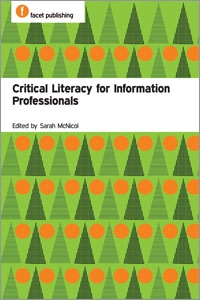
Primary tabs
You don't need to be an ALA Member to purchase from the ALA Store, but you'll be asked to create an online account/profile during checkout to proceed. This Web Account is for both Members and non-Members. Note that your ALA Member discount will be applied at the final step of the checkout process.
If you are Tax-Exempt, please verify that your account is currently set up as exempt before placing your order, as our new fulfillment center will need current documentation. Learn how to verify here.
- Description
- Table of Contents
- About the author
- Reviews
With critical literacy there is no single "correct" way to read and respond to a text; its use involves a commitment to equity and social justice through the explicit inclusion of those marginalized on the basis of gender, sexuality, ethnicity, class or other forms of difference. This book provides a foundation of critical literacy theory, as applied to libraries; combines theory and practice to explore critical literacy in relation to different user groups; and offers practical ways to introduce critical literacy approaches in libraries. Featuring contributions from a wide variety of international experts, this book covers such topics as:
- radical information literacy as an approach to critical literacy education;
- critical literacy and mature students;
- physical and digital disability access in libraries;
- teaching critical literacy skills in a multicultural, multilingual school community;
- teaching media literacy;
- developing critical literacy skills in an online environment; and
- new media and critical literacy in secondary schools.
This book aims to be accessible to those with little knowledge of critical literacy, while also introducing debates and ideas to those with more experience of the field. It will be essential reading for librarians, information professionals and managers in all types of libraries, students of library and information science, and higher education teachers and researchers.
Introduction - Sarah McNicol
PART 1: THEORIES OF CRITICAL LITERACY
1. Renegotiating the place of fiction in libraries through critical literacy - Sarah McNicol
2. Death of the Author(ity): Repositioning students as constructors of meaning in information literacy instruction - Jessica Critten
3. Reading health education comics critically, challenging power relationships - Sarah McNicol
4. Reframing librarian approaches to international student information literacy through the lens of New Literacy Studies - Alison Hicks
5. Using new literacies to discuss disability in the library - JJ Pionke
6. "Anyone can cook": critical literacy in the workplace - Andrew Whitworth
7. Social justice, adult learning and critical literacy - Jennifer Lau-Bond
PART 2: CRITICAL LITERACY IN PRACTICE
8. A Picture is Worth a Thousand Words: Teaching Media Literacy - Michael Cherry
9. Curricular and extra-curricular opportunities to engage school students in critical literacy in England - Rebecca Jones
10. New media and critical literacy in secondary schools - Joel Crowley
11. Critical literacy and academic honesty: a school librarian's role and contribution - Anthony Tilke
12. Engaging Undergraduate Communications Students in critical information literacy - Rachel Elizabeth Scott
13. Exploring pedagogical implications of students' search mediation experiences though the lens of critical information literacy - Sarah Clark
14. Diffusing critical web literacy in a teacher education setting: initial reflections and future planning - Evangelia Bougatzeli and Efi Papadimitriou
Sarah McNicol
Sarah McNicol is a research associate at the Education and Social Research Institute, Manchester Metropolitan University, UK. She has worked as an Information Studies researcher since 2000, and has particular interests in information literacy, lifelong learning, and school and children's libraries. She has published widely in the information studies field and has previously guest edited a number of journals, including Library Review and Library Trends.
"The essays are concisely written and easy to parse for details ... Essential reading for librarians looking to gain an understanding of critical literacy in order to improve their support services."
— Library Journal
"Given the current cultural and political climates, learning about critical literacy and its various applications becomes even more relevant and important. One can see how critical literacy should be in the forefront of instruction today. I would recommend this book to anyone interested in learning more about this topic, especially instruction librarians interested in finding ways to teach critical literacy concepts."
— Against the Grain


